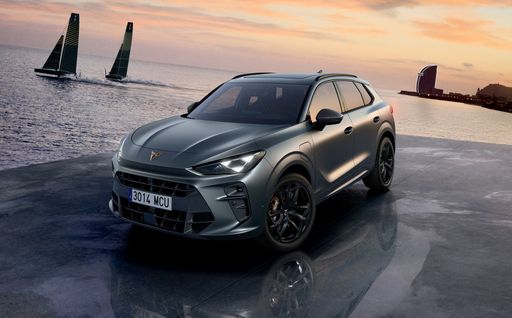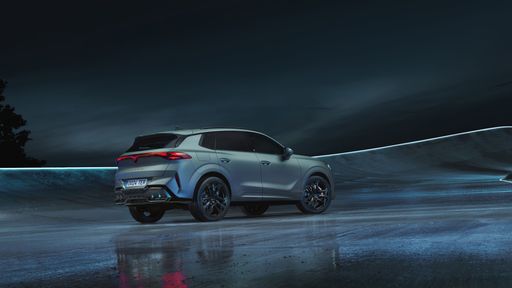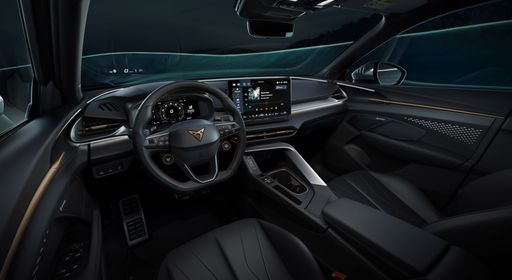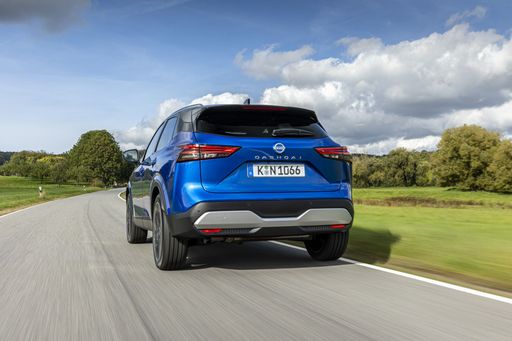CUPRA Terramar vs Nissan Qashqai - Differences and prices compared
Compare performance (272 HP vs 205 HP), boot space and price (36900 £ vs 29600 £ ) at a glance. Find out which car is the better choice for you – CUPRA Terramar or Nissan Qashqai?
Costs and Efficiency:
Looking at overall running costs, both models reveal some interesting differences in everyday economy.
Nissan Qashqai has a distinct advantage in terms of price – it starts at 29600 £ , while the CUPRA Terramar costs 36900 £ . That’s a price difference of around 7269 £.
Fuel consumption also shows a difference: CUPRA Terramar manages with 1.60 L and is therefore decisively more efficient than the Nissan Qashqai with 4.50 L. The difference is about 2.90 L per 100 km.
Engine and Performance:
Power, torque and acceleration say a lot about how a car feels on the road. This is where you see which model delivers more driving dynamics.
When it comes to engine power, the CUPRA Terramar has a clearly perceptible edge – offering 272 HP compared to 205 HP. That’s roughly 67 HP more horsepower.
In acceleration from 0 to 100 km/h, the CUPRA Terramar is evident quicker – completing the sprint in 5.90 s, while the Nissan Qashqai takes 7.60 s. That’s about 1.70 s faster.
In terms of top speed, the CUPRA Terramar performs slightly better – reaching 243 km/h, while the Nissan Qashqai tops out at 206 km/h. The difference is around 37 km/h.
There’s also a difference in torque: CUPRA Terramar pulls slightly stronger with 400 Nm compared to 330 Nm. That’s about 70 Nm difference.
Space and Everyday Use:
Whether family car or daily driver – which one offers more room, flexibility and comfort?
Both vehicles offer seating for 5 people.
In curb weight, Nissan Qashqai is to a small extent lighter – 1420 kg compared to 1638 kg. The difference is around 218 kg.
In terms of boot space, the CUPRA Terramar offers hardly perceptible more room – 540 L compared to 504 L. That’s a difference of about 36 L.
When it comes to payload, CUPRA Terramar slight takes the win – 542 kg compared to 520 kg. That’s a difference of about 22 kg.
Who wins the race in the data check?
The CUPRA Terramar is clearly superior overall in the objective data comparison.
This result only shows which model scores more points on paper – not which of the two cars feels right for you.
Costs and Consumption
View detailed analysis
Engine and Performance
View detailed analysis
Dimensions and Body
View detailed analysis

CUPRA Terramar
CUPRA Terramar
The CUPRA Terramar is a sharply styled, sporty SUV that brings athletic handling and bold design to buyers who want performance with everyday usability. Inside, premium finishes meet driver-focused flair and family-friendly practicality, making it a tempting pick for anyone who wants thrills without turning their daily routine into a chore.
details


Nissan Qashqai
The Nissan Qashqai blends practical, family-friendly packaging with SUV styling that refuses to shout, making it a sensible and dependable choice for everyday life. It’s comfortable to live with, economical on the road, and neatly equipped enough to feel modern without ever feeling precious — perfect if you want crossover versatility without the drama.
details




Costs and Consumption |
|
|---|---|
|
Price
36900 - 50600 £
|
Price
29600 - 39900 £
|
|
Consumption L/100km
1.6 - 8.4 L
|
Consumption L/100km
4.5 - 6.8 L
|
|
Consumption kWh/100km
-
|
Consumption kWh/100km
-
|
|
Electric Range
118 km
|
Electric Range
-
|
|
Battery Capacity
-
|
Battery Capacity
-
|
|
co2
36 - 191 g/km
|
co2
102 - 154 g/km
|
|
Fuel tank capacity
55 - 60 L
|
Fuel tank capacity
55 L
|
Dimensions and Body |
|
|---|---|
|
Body Type
SUV
|
Body Type
SUV
|
|
Seats
5
|
Seats
5
|
|
Doors
5
|
Doors
5
|
|
Curb weight
1638 - 1904 kg
|
Curb weight
1420 - 1665 kg
|
|
Trunk capacity
450 - 540 L
|
Trunk capacity
479 - 504 L
|
|
Length
4519 mm
|
Length
4425 mm
|
|
Width
1869 mm
|
Width
1835 mm
|
|
Height
1586 mm
|
Height
1625 mm
|
|
Max trunk capacity
-
|
Max trunk capacity
1422 - 1447 L
|
|
Payload
512 - 542 kg
|
Payload
466 - 520 kg
|
Engine and Performance |
|
|---|---|
|
Engine Type
Petrol MHEV, Petrol, Plugin Hybrid
|
Engine Type
Petrol MHEV, Full Hybrid
|
|
Transmission
Automatic
|
Transmission
Manuel, Automatic
|
|
Transmission Detail
Dual-Clutch Automatic
|
Transmission Detail
Manual Gearbox, CVT, Reduction Gearbox
|
|
Drive Type
Front-Wheel Drive, All-Wheel Drive
|
Drive Type
Front-Wheel Drive, All-Wheel Drive
|
|
Power HP
150 - 272 HP
|
Power HP
140 - 205 HP
|
|
Acceleration 0-100km/h
5.9 - 9.3 s
|
Acceleration 0-100km/h
7.6 - 10.2 s
|
|
Max Speed
205 - 243 km/h
|
Max Speed
170 - 206 km/h
|
|
Torque
250 - 400 Nm
|
Torque
240 - 330 Nm
|
|
Number of Cylinders
4
|
Number of Cylinders
3 - 4
|
|
Power kW
110 - 200 kW
|
Power kW
103 - 151 kW
|
|
Engine capacity
1498 - 1984 cm3
|
Engine capacity
1332 - 1498 cm3
|
General |
|
|---|---|
|
Model Year
2024 - 2025
|
Model Year
2025
|
|
CO2 Efficiency Class
E, G, F, B
|
CO2 Efficiency Class
E, C
|
|
Brand
CUPRA
|
Brand
Nissan
|
What drivetrain options does the CUPRA Terramar have?
The CUPRA Terramar is available as Front-Wheel Drive or All-Wheel Drive.




